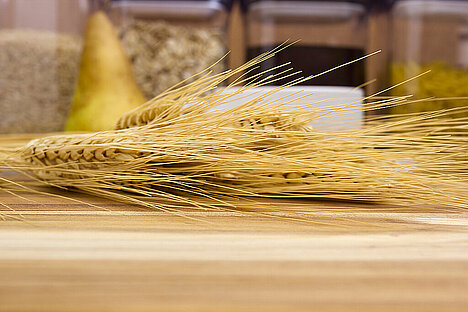Phytic acid

What is phytic acid?
Phytic acid is an organic acid that binds phosphorus and other minerals. It is mainly found in cereals, pulses, nuts, seeds and kernels. Phytic acid is also known as a "mineral trap" because it can inhibit the absorption of important minerals such as calcium, iron or zinc in the intestine. This can lead to deficiency symptoms or bone loss.
However, phytic acid also has positive effects: It has an antioxidant effect and can neutralize free radicals. It can also prevent the formation of kidney stones and strengthen the immune system.
How much phytic acid is good for your dog?
The optimal amount of phytic acid for your dog depends on various factors: your dog's age, state of health, activity level and the rest of its diet. The general rule is: not too much and not too little.
If you feed your dog BARF (biologically appropriate raw food), you should limit the carbohydrate content to 10% of the total ration. This reduces the intake of phytic acid from plant sources. You should also increase the proportion of bones to compensate for the possible loss of calcium.
If you give your dog dry or wet food, make sure that it does not contain any soy products. These are particularly rich in phytic acid and can lead to stomach problems or even death in your dog.
How can you reduce the effect of phytic acid?
There are various methods to reduce the effect of phytic acid on mineral absorption:
- Soaking: If you feed grains or legumes, soak them in water for at least 12 hours beforehand. This removes some of the phytic acid from the food.
- Sprouting: If you feed seeds or grains, let them germinate. This activates enzymes that break down the phytic acid.
- Ferment: If you feed sauerkraut or yogurt, you'll benefit from fermentation. This produces lactic acid bacteria, which also break down phytic acid.
- Vitamin C: If you feed vitamin C-rich foods such as fruit or vegetables or supplement with additional vitamin C (but don't overdo it), you can improve iron absorption.
Phytic acid is a natural substance with advantages and disadvantages for your dog. You should make sure
- that your dog does not ingest too much of it,
- that he gets enough minerals,
- that he does not eat soy products,
- that you prepare plant-based foods correctly.
This way you can ensure that your dog stays healthy, does not develop any deficiency symptoms and benefits from the positive effects of phytic acid.
If you notice any signs of hypersensitivity or poisoning in your dog, you should see your vet immediately. We are not a substitute for a vet, but we try to be as accurate as possible. Every dog reacts differently and we recommend you get a second opinion or consult your vet if in doubt.
Stay healthy and take good care of your four-legged friend!😊